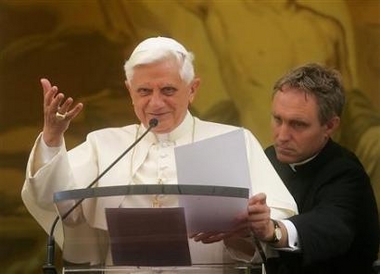VATICAN CITY - Al Qaeda militants in Iraq vowed war on "worshippers of the
cross" and protesters burned a papal effigy on Monday over Pope Benedict's
comments on Islam, while Western churchmen and statesmen tried to calm passions.
The statement by an umbrella group led by Iraq's branch of al Qaeda came
after the Pontiff said on Sunday he was deeply sorry Muslims had been offended
by his use of a medieval quotation on Islam and holy war.
|

Pope Benedict gestures to the faithful during
his Sunday Angelus prayer from his summer residence in Castel Gandolfo,
outside Rome, September 17, 2006.
[Reuters]
|
"We tell the worshipper of the cross (the Pope) that you and the West will be
defeated, as is the case in Iraq, Afghanistan, Chechnya," said a Web statement
by the Mujahideen Shura Council.
"We shall break the cross and spill the wine ... God will (help) Muslims to
conquer Rome ... (May) God enable us to slit their throats, and make their money
and descendants the bounty of the mujahideen," said the statement, posted on
Sunday on an Internet site often used by al Qaeda and other militant groups.
In Iraq's southern city of Basra, up to 150 demonstrators chanted slogans and
burned a white effigy of the Pope.
"No to aggression!," "We gagged the Pope!," they chanted in front of the
governor's office in the Shi'ite city. The protesters also burned German, US,
and Israeli flags.
A speech by Pope Benedict last Tuesday was seen as portraying Islam as a
religion tainted by violence, causing dismay among Muslim states where some
religious leaders called it the start of a new Christian crusade against Islam.
The Vatican has instructed its envoys in Muslim countries to explain Pope
Benedict's words on Islam.
Benedict's new Secretary of State, Cardinal Tarcisio Bertone, said the Holy
See's nuncios (ambassadors) in Muslim countries would be visiting government and
religious leaders.
French President Jacques Chirac refused on Monday to criticize the
79-year-old Pontiff, but called for a more diplomatic use of language.
"It is not my role or my intention to comment on the Pope's statements. I
simply want to say, on a general level ... that we must avoid anything that
excites tensions between peoples or between religions," Chirac said on Europe 1
radio.
"We must avoid making any link between Islam, which is a great, respected and
respectable religion, and radical Islamism, which is a totally different
activity and one of a political nature," Chirac added.
ARCHBISHOP DEFENDS POPE
The head of the world's Anglican church, Archbishop of Canterbury Rowan
Williams, defended Benedict.
"The Pope has already issued an apology and I think his views on this need to
be judged against his entire record, where he has spoken very positively about
dialogue," said Williams, the spiritual leader of 77 million Anglicans
worldwide.
Williams told the BBC that all faiths could be distorted, and the Pope was
simply giving an example of that.
"There are elements in Islam that can be used to justify violence, just as
there are in Christianity and Judaism."
In Iran, a government spokesman said on Monday Pope Benedict's regret was a
"good gesture" but not enough.
The Pope had referred to criticism of the Prophet Mohammad by 14th century
Byzantine Emperor Manuel II Palaeologus, who said everything the Prophet brought
was evil "such as his command to spread by the sword the faith he preached."
Questions had been raised on whether a papal visit to Turkey in November
could go ahead, but the government, while calling his remarks "ugly," said there
were no plans to call it off.
The Pope, head of the world's 1.1 billion Roman Catholics, said the quotation
did not represent his personal views, but failed to satisfy some Islamic groups
seeking a full apology.
In Somalia, an Italian nun was killed on Sunday in an attack one Islamist
source said could be linked to the dispute. A Vatican spokesman hoped the
killing was "an isolated event."
A senior Chinese Muslim expressed anger over the Pope's comments, Xinhua news
agency said on Monday. This was in contrast to Chinese reticence over last
year's publication of cartoons of the Prophet Mohammad in a Danish paper that
sparked violent Muslim protests elsewhere in the world.
"In his speech, Benedict insulted both Islam and the Prophet Mohammad. This
has gravely hurt the feelings of the Muslims across the world, including those
from China," Xinhua quoted Chen Guangyuan, president of the Islamic Association
of China, as saying.
About 100 Indonesian Muslims protested peacefully over the Pope's remarks
outside the Vatican embassy in Jakarta on Monday.